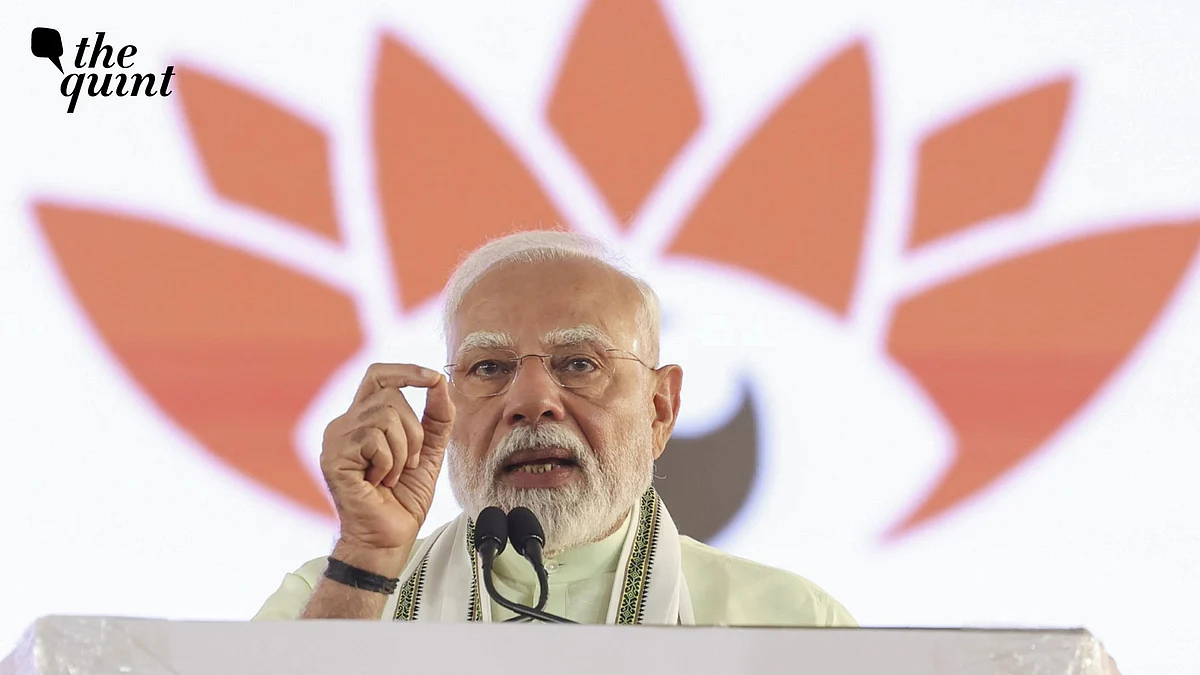
Decoding Optics of Modi in Nagpur as Trump Tariffs Loom Over RSS Agro Interests
By reiterating loyalty to RSS, Modi has signaled he won't compromise its interests even as he cedes to US demands.

advertisement
It is interesting that Prime Minister Narendra Modi has chosen to invoke his Sangh roots, reaffirmed by a much hyped visit to the Rashtriya Swayamsevak Sangh (RSS) headquarters in Nagpur on 30 March, at a time when his government is gearing up for trade talks with the US to mitigate the impact of President Donald Trump’s decision to slap the world with reciprocal tariffs.
The timing is significant because some of the issues on the table for discussion with the Trump administration are likely to clash with RSS' interests and its fundamental beliefs arising from its philosophy of swadeshi economics.
By recalling his long association with the Sangh, heaping lavish praise on the organisation as "a banyan tree of immortal culture and modernity’’ and emphasising its role in the march towards Viksit Bharat, Modi has positioned himself squarely within the RSS ideological fold.
In doing so, he seems to be addressing both the US and the RSS simultaneously, but with different messages.
Agriculture Sector Key Sector of Intesrest
For the US, Modi has attempted to draw red lines for the upcoming negotiations by holding up the RSS as a mentor and guiding force for the Bharatiya Janata Party (BJP). There will be accommodation and concessions but not at the cost of derailing the Sangh’s economic vision to satisfy US interests.
The message to the RSS is one of reassurance laced with an appeal for understanding and flexibility as India picks her way through the chaos that Trump has unleashed on the world.
Details are yet to emerge as talks with the US are in the initial stages. However, those familiar with Washington’s wish list say that a key sector high on the US agenda that is bound to ruffle feathers in the RSS is agriculture.
The US has been pushing for increased trade and cooperation in this area with demands for India to import food produce, GM crops and seeds, fertilisers, etc. Pressures for India to remove restrictive trade barriers pre-date Trump, underlining Washington’s keenness to find new markets for agricultural produce.
It can only spell trouble for the Modi government, which will have to balance US demands with RSS concerns. Those familiar with RSS thinking say that agriculture is a highly sensitive issue for the Sangh. It has always prioritised farmers and has active affiliates like the Bharatiya Kisan Sangh (BKS), which work closely with agriculturists, particularly those with small holdings.
Sangh-Farmer Alliance?
On at least two occasions, the RSS has prevailed on Modi to reverse new policy proposals that the Sangh felt was inimical to farmer interests.
The first time was early in Modi’s tenure during his first term when he wanted to amend the Land Acquisition Act to ease corporate purchases of farmland. The RSS shot it down, and Modi was forced to withdraw his proposed amendments.
Among the many contentious issues that is bound to create tensions with the RSS is the longstanding US demand for India to remove regulations imposed by the Food Safety and Standards Authority of India on GM crops and seeds.
Previous governments have managed to hold out because of domestic opposition, but no government has had to deal with Trump’s bullying tactics to get what he wants.
It is clear then that the Modi government is bracing itself for some tough and fractious negotiations ahead as the Trump Administration flexes its muscles to browbeat India into submission. Now, more than ever before, Modi needs the RSS on his side, if only to prevent dissonance from within as discussions get into the nitty-gritties of knotty trade and tariff issues.
The context to Modi’s 17-minute halt in Nagpur then is much more than elections and Hindutva. The PM is looking ahead, beyond domestic challenges, at the larger international picture of Trumpian disruption and the impact on India. As he navigates the choppy waters ahead, he has made it clear that the RSS will be his compass.
Most missed the signals, but the first hint came in an interview to American podcaster Lex Fridman.
Not only did he spring a surprise by speaking to a foreign journalist face-to-face for three hours but he also dwelt at length on his long association with the RSS which he described as "a source of inspiration" for him.
In hindsight, Modi was clearly attempting to reach a foreign audience, including Trump and his associates. Significantly, Trump promptly posted the podcast on his Truth Social platform with a shower of praises.
Time will tell how Modi and the RSS respond to Trump and his demands for India to lower trade and tariff barriers.
(Arati R Jerath is a Delhi-based senior journalist. She tweets @AratiJ. This is an opinion piece, and the views expressed above are the author’s own. The Quint neither endorses nor is responsible for the same.)
- Access to all paywalled content on site
- Ad-free experience across The Quint
- Early previews of our Special Projects
Published: undefined